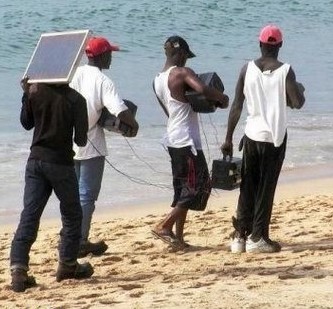Solar Education Jamaica. In the Sunday May 27th edition of the Jamaican Gleaner, former Prime Minister Edward Seaga penned a very moving and lucid plea for the island nation – and the entire world – to speed up the inevitable transition to solar power.
The op-ed piece would have been applicable two years ago in 2010 – a time when PM Seaga points out that in Jamaica “the value of imported oil was equivalent to a staggering 121.1% of domestic exports at present costs.”
But it’s not 2010. It’s 2012. And the focus of this article was on rising fuel prices and the end up cheap oil.
According to the most optimistic predictions, oil production will likely peak between 2013 and 2037, after which, production will shrink 3% a year – even as both the global population and energy consumption per capita continue to grow.
In a country like Jamaica, which is already dangerously dependent on foreign fuel, the end of cheap oil could be especially severe. No country will be spared entirely, but when your oil imports dwarf the sum total of all exports in all industries, this is a recipe for disaster.
Solar Energy As an Immediate, Permanent, and Sustainable Solution
PM Seaga continues his piece with an incredibly strong argument for solar energy as the key to unlocking Jamaica’s potential and solving her current and pending energy crises. He writes,
I have focused on the power of the sun as a principal alternative resource not because other renewable resources do not exist, but because wind, water, wood and waste are all restricted to particular local or regional locations for purposes of generating electrical power needs. But the power of the sun is ubiquitous; it is available everywhere and is an inexhaustible resource that can be within the reach of all mankind.
We at US Solar Institute couldn’t agree more. But we also recognize the very real challenges that nations like Jamaica face – namely, the current lack of a self-sustaining solar industry complete with education, manufacturing, national codes, solar incentives, and everything else you need for a successful green revolution.
The Need for Solar Education Jamaica – PV power courses and training
If you ask a hundred different people where to begin in a country like Jamaica, you’ll likely get 100 different answers.
But our approach is simple.
Manufacturing, you can import piecemeal – buying the solar parts you need until you have the production infrastructure to begin fabricating solar systems on your own. We already are involved in this step of the process, selling tariff-free solar parts throughout the Caribbean.
Codes & standards are easy enough – there already exists a huge body of best practices scattered across the globe. Jamaica could simply import whichever set of standards is most applicable to its unique situation. This is not an overnight process by any means, and Jamaica may need to combine different aspects of different codes to find the perfect formula. But the process is well within reach.
Regulations & incentives are a bit trickier – Jamaica doesn’t have the coffers to launch ambitious solar incentives (very few countries do in this economic climate). However, Jamaica does face an interesting challenge that lessens the need for incentives. It already has incredibly high electricity prices in a world of rapidly falling PV prices. This ratio increasingly makes solar energy cost effective – even without the types of generous government support you see in Japan, Ontario, or Germany.
The main challenge Jamaica faces is solar education – i.e. certifying and training solar installers to actually get up on rooftops and outfit homes, businesses, and government buildings with PV technology. Without these hands on deck, no substantial progress can possibly emerge.
Jamaica could always import the labor it needs. But such strategies simply aren’t practical. It takes weeks, if not months, to recruit outside talent, to say nothing of the visas, paperwork, flights, temporary housing, and the sheer logistics of hosting an outside workforce. Contrast this with solar power courses, many of which can be completed in a standard workweek.
It’s far more practical to train Jamaicans for Jamaican solar installations.
Jamaican Solar Education Needs to Come Home
Here in Florida, we currently train our fair share of Jamaican solar installers. Just a brief plane ride away, US Solar Institute offers Department of Labor-licensed solar power courses in a climate remarkably similar to Jamaica, making the transition easy.
But as proud as we are of our contributions – solar education truly needs to take place in Jamaica if it is to sustain the type of solar transformation that the country so badly needs. Carrying the know how student-by-student from Florida back to Jamaica simply won’t be enough in the long run.
In the coming months, we hope to help resolve this situation.
US Solar Institute will soon launch a satellite solar education campus in Jamaica – for Jamaicans.
Stay tuned for these developments. We’ll soon be bringing solar power courses to you.
Whether you want more information about our upcoming Kingston office or you’re eager to come join us in Florida for immediate solar training, we want to hear from you. Don’t hesitate to contact us.


